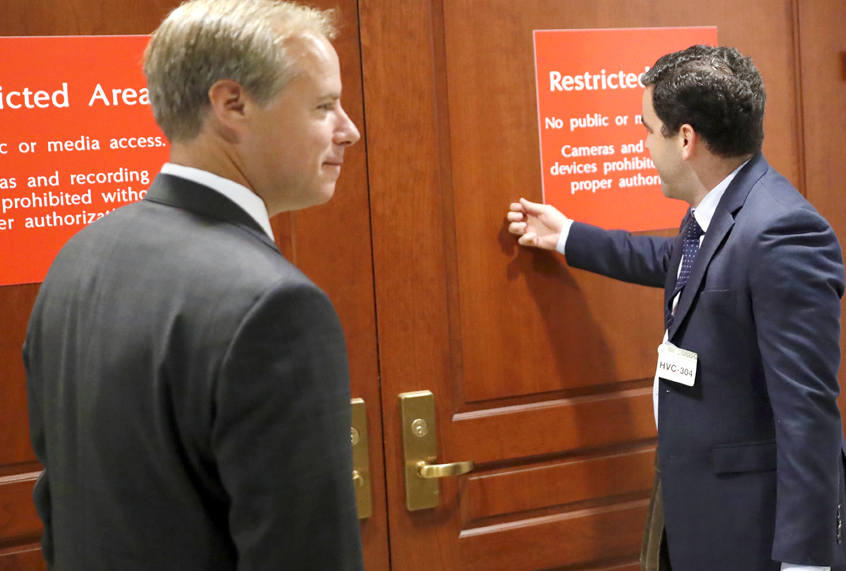The top Democrats investigating allegations of Russian attempts to influence American politics blasted Twitter on Thursday for not doing enough to determine the extent to which many of its user accounts are controlled by Russian intelligence operatives.
“I’m more than a bit surprised, in light of all the public interest from the subject, that anyone from the Twitter team would think that the presentation made to Senate staff today even began to answer the kinds of questions that we’d asked,” Virginia Sen. Mark Warner told reporters after a closed-door briefing that Twitter held for members of both houses of Congress. “There’s a lot more work they have to do.”
The company released a blog post describing some of the details that it provided to congressional investigators, including a disclosure that it had found about 200 accounts which it believed were linked to the Russian government, either officially or unofficially.
The Twitter review seems to come about in response to account data provided to the micro-blogging platform by Facebook, which had conducted its own analysis of millions of its user profiles.
Rep. Adam Schiff, D-Calif., was more diplomatic than Warner in his response, saying that Twitter needed to conduct a larger review rather than just responding to Facebook’s information.
“It is clear that Twitter has significant forensic work to do to understand the depth and breadth of Russian activity during the campaign,” Schiff told Politico in an emailed statement.
Many Twitter accounts are partially or fully automated, meaning that posts appear automatically when a website publishes content, or when other Twitter users send tweets mentioning certain phrases or hashtags. Unlike most other social media platforms, Twitter does not prohibit automated accounts, also sometimes called “Twitter bots.” Many government agencies as well as legitimate news organizations and activist groups utilize automated feeds to share their messages with Twitter followers. Sometimes, automated accounts are used for humorous purposes, such as the account “Real Press Sec.” which generates a real-looking press release based upon every tweet sent out by President Donald Trump.
Because automated bot accounts are allowed in certain forms, it is difficult for Twitter to police its platform for abuse from bots. The sheer volume of tweets that are sent every day also makes it difficult for Twitter to track abuse of bot accounts.
While Twitter allows automated accounts to exist on its platform, it does prohibit spam postings — such as when bots repeatedly post the same phrases, which sometimes constitute attempts to manipulate the site’s popular Trending Topics feature. In its efforts to block users who merely post the same information repeatedly, the company said that it has created several measures to detect inappropriate activity.
“As patterns of malicious activity evolve, we’re adapting to meet them head-on. On average, our automated systems catch more than 3.2 million suspicious accounts globally per week — more than double the amount we detected this time last year,” the social network wrote Thursday.
Besides spreading disinformation, Twitter has also been accused of counting illegitimate accounts in the user numbers it presents to investors. The company pushed back strongly against this in its blog post.
“We have not and do not include spam accounts that we have identified in the active user numbers that we report to shareholders,” the unsigned statement reads.
Nearly 15 percent of Twitter accounts have been estimated to be automated, according to a University of Southern California study.
In an earlier statement posted in June, Colin Crowell, the company’s vice president for public policy, argued that Twitter’s real-time nature was self-correcting in many ways since replies to any tweet are also displayed below it, meaning anyone can dispute assertions made by someone else.
“Twitter’s open and real-time nature is a powerful antidote to the spreading of all types of false information,” he wrote. “This is important because we cannot distinguish whether every single Tweet from every person is truthful or not. We, as a company, should not be the arbiter of truth.”
There may be some truth to this claim. According to another report released by a research organization affiliated with Harvard University, web sites and organizations who distribute low-quality or false news have much greater popularity on Facebook than on Twitter.
“Disproportionate popularity on Facebook is a strong indicator of highly partisan and unreliable media,” the researchers wrote.

